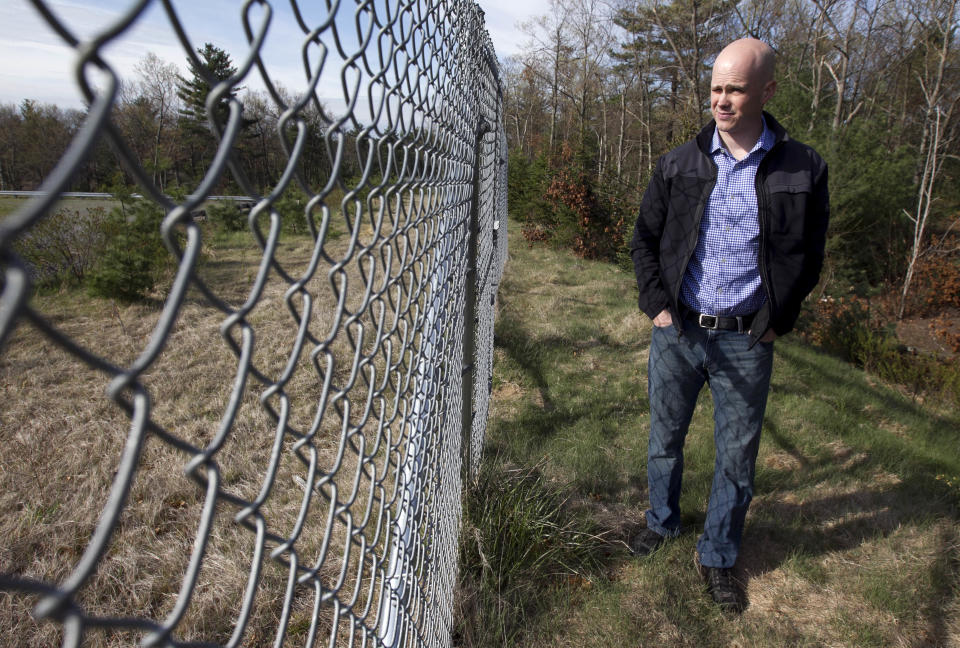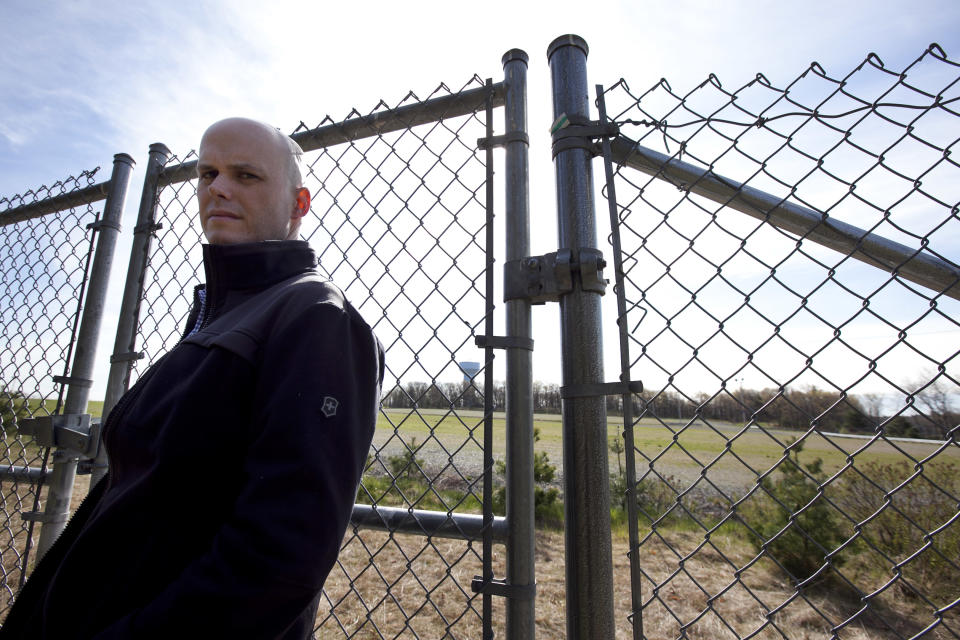Some living near Mass. casino sites feel left out
WALPOLE, Mass. (AP) — Mike McCarthy's home is about as close to the site of a proposed resort casino in Foxborough as you can possibly get, but as things now stand he'd have little or no say in whether it gets built.
A chain-link fence at the top of a small grassy knoll that separates the edge of McCarthy's property from the large vacant lot behind it also marks the boundaries of two towns. So while the state's new gaming law requires a vote of approval from residents of the town where a casino will be built, McCarthy and his neighbors — Walpole residents — would likely have no vote though they live nearer to the site than anyone in Foxborough.
"We never thought a casino would be in our backyard," said McCarthy, a 36-year-old father of two young children who moved his family to the quiet residential neighborhood two years ago. His and others' lands abut land owned by New England Patriots owner Robert Kraft and on which Las Vegas casino magnate Steve Wynn hopes to develop a $1 billion resort.
But the concerns of McCarthy and his neighbors, while unusual, are not unique in Massachusetts. Many people who live near potential casino locations are also demanding a stronger, if not equal voice, in the approval process as those who actually live in the communities where casinos may be built.
Backers of the casino law say it includes plenty of protection for neighboring cities or towns. The law requires developers to negotiate so-called mitigation agreements with surrounding communities. While not specified, such agreements could include money for such things as traffic improvements or additional police.
The law also requires the state's five-member gaming commission to hold a public hearing on casino license applications that may include testimony from residents of neighboring towns.
"Surrounding communities have a fair amount of leverage," said commission chairman Stephen Crosby.
But not enough leverage for some who worry about traffic jams caused by people going to and from casinos in neighboring communities, or a rise in crime or other social ills associated with gambling. They claim such negatives would offset any benefits from mitigation funds or the jobs that a casino might create.
One casino is proposed for the Suffolk Downs horse racing track, which straddles the East Boston neighborhood and the city of Revere. Both would be designated as host communities and residents of each would get a vote before a casino was built.
But nearby Winthrop also deserves a vote, since many of its residents live within a mile of the track and the town's two major traffic arteries both go by Suffolk Downs, said John Ribeiro, a Winthrop resident who heads the anti-casino group Neighbors of Suffolk Downs.
"Traffic is going to be unbearable," he said.
"Property values are going to go down and property taxes are going to up to deal with the problems," he added.
Ribeiro also contends that the law contains no clause that would strip a casino of its license if it fails to abide by its mitigation agreements with surrounding communities.
State Rep. John Rogers, a Democrat who represents Walpole, argued in a recent letter sent to Crosby that the town should have host community status and its residents allowed to vote.
He said the proposed Wynn casino would have to tap into Walpole water and sewer systems and the town would have to provide access for emergency vehicles leaving or entering the site.
"Without Walpole, the casino cannot work," Rogers wrote.
Crosby, who responded prior to the commission's first full formal meetings, promised that the panel would pay serious attention to the issues Rogers raised.
For the Foxborough project, Wynn Resorts said in a statement that it would be inappropriate to start negotiations with any surrounding community because it has yet to gain permission to begin host community talks with Foxborough, where the project has also been the subject of heated debate.
"That said, we have no intention of excluding anyone from learning about our proposal," the company said.
Other potential casino developers around Massachusetts have pledged to be sensitive to the concerns of neighboring communities, including Mohegan Sun, which has proposed a resort casino in Palmer, a town nestled among several largely rural communities in the western part of the state.
"We're aware that we are not just in Palmer," said Paul Brody, vice president of Mohegan Gaming Advisors. "We will be diligent around setting up and being mindful of the needs of the smaller towns outside of Palmer."
Officials of more than a dozen communities within a 30-mile radius of the proposed Palmer casino formed a task force to explore potential regional impacts of a casino and pool their influence in future licensing decisions.
Right now, the unpaved, 200-acre lot envisioned as the site of the Foxborough casino is used for overflow parking during Patriots games at nearby Gillette Stadium. It's visible through a thicket of trees about 50 feet from a swing set that McCarthy's children, ages 7 and 4, play on.
McCarthy said he was fully aware when he bought his Walpole home that the lot would eventually be developed, perhaps into an office park or retail complex.
But he said he never envisioned a casino operating 24 hours, seven days a week. Casino gambling was illegal in Massachusetts until the law signed last year.
McCarthy said it was not far-fetched to imagine casino patrons, possibly drunk after hours of gambling, wandering into the woods and on to his property, or using his quiet street as a shortcut to get home.
"Right now it's an extremely kid-friendly neighborhood, a very close-knit neighborhood where kids can ride their bikes and play somewhat freely outside, running from yard to yard, and all that would be taken away," he said.
___
Associated Press writer Steve LeBlanc in Boston contributed to this report.




